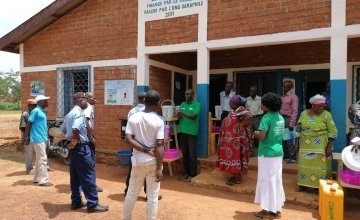
Read our 2023 annual report

Knowledge Hub
Escalating conflict prevents life-saving aid reaching two million people in the Central African Republic

Concern Worldwide today warned that the escalating conflict in the Central African Republic (CAR) is preventing humanitarian organisations from reaching an estimated 2.3 million people currently in dire need of food and assistance.
CAR is one of the world’s poorest and hungriest countries with half the population in need of assistance even prior to the latest conflict (see notes to the editor). With militia controlling large swathes of the west, central and eastern parts of the country, and armed conflict with government forces escalating since elections in December, humanitarian organisations are struggling to get access or supplies to communities.
“Less than 40% of non-government organisations’ (NGOs) operations are currently continuing due to a lack of safe access,” Concern’s Country Director Elise Ponson said. “This is in a country where almost all basic services such as healthcare, education and food assistance outside of the capital are provided by NGOs.”
Concern is continuing to maintain its operation in one town, but it is very difficult to assess the scale of the humanitarian needs in most rural areas as it is not safe to travel by road, Ms Ponson said.
Food Shortages
Insecurity along the main supply route between the capital, Bangui, and the Cameroon border has resulted in 1,600 trucks being stuck at the border crossing. These include 500 trucks of humanitarian aid.
“One of our key food suppliers confirmed yesterday that their stores are empty,” Ms Ponson said. “Even if we had food, the current insecurity means we cannot transport it to communities that need it.”
Food shortages have resulted in the price of staple foods such as sorghum soaring by 50% in recent weeks in Bangui. “Our staff – who would be deemed to be middle income because they work for an NGO – are telling us that the price rises are unbearable,” she said.
Tipping Point
CAR is currently at a ‘tipping point’ Ms Ponson said. “If all sides can respect international humanitarian law and ensure safe access for humanitarian organisations, then we can quickly return to providing humanitarian assistance, and recovery and resilience programmes. However, if the conflict is prolonged this could quickly develop into an even more severe humanitarian crisis.”
Even prior to the latest upsurge in violence, UN agencies and NGOs estimated that 2.8 million of CAR’s 4.7 million population were in need of humanitarian assistance and protection. Of these, they estimated that 2.3 million would be facing crisis or emergency (pre-famine) levels of food needs by May 2021.
“The massive humanitarian challenge facing us is clear for all to see, and it’s worsening by the day. Humanitarian organisations are on the ground and desperate to continue programmes, but we need a secure environment in order to access communities if we are to prevent a bad situation from rapidly developing into a major humanitarian crisis.”
For media queries or to arrange interviews contact Eamon Timmins, Media Relations Manager, Concern Worldwide, at eamon.timmins@concern.net or 00 353 87 9880524.
Notes to the Editor
- CAR was ranked the hungriest country in the world in the 2019 Global Hunger Index. In the 2020 Human Development Index it was ranked 188th out of 189 countries (ahead of Niger). CAR has one of the world’s highest rates of child mortality.
Other ways to help
Corporate support
Is your company interested in working together for a common cause?
Fundraise for Concern
From mountain trekking to marathon running, cake sales to table quizzes, there are lots of ways you can support our work.
Buy a gift
With an extensive range of alternative gifts, we have something to suit everybody.
Leave a gift in your will
Leave the world a better place with a life-changing legacy.
Volunteer with Concern
The lots of ways to get involved with our work as a volunteer
School fundraising
Without the generous support from schools, we wouldn't be able to do the work that we do.

